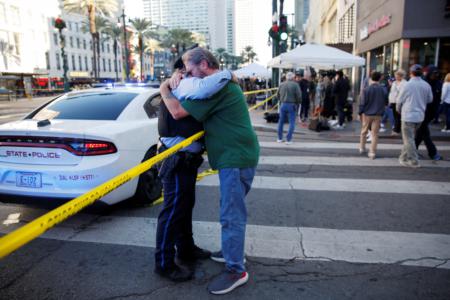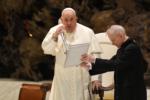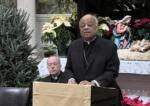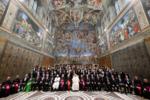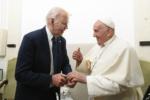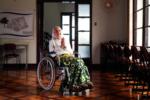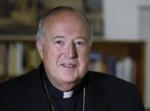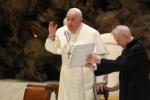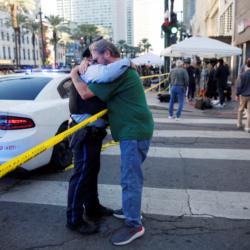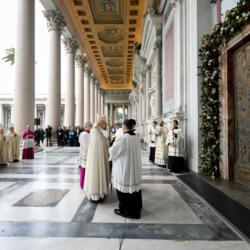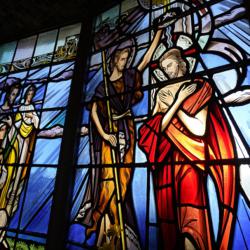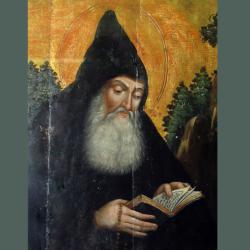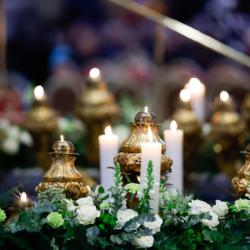McElroy goes to Washington: Cardinal brings intellect, policy interest and controversy
(OSV News) -- Since Cardinal Robert W. McElroy's Jan. 6 appointment to the Archdiocese of Washington, church watchers have interpreted the move as a papal endorsement of the prelate's outspoken support for the poor and those on the margins, including those who identify as LGBTQ+, as well for the church's teaching on immigration at the start of a presidential administration that has called for mass deportations.
While many celebrate his more progressive vision, Cardinal McElroy also has attracted vocal critics of the theological underpinnings of some of his arguments, including on reception of the Eucharist, leading a fellow bishop in 2023 to publicly question whether a cardinal defending such arguments might be guilty of heresy. He has also been accused of mishandling information related to clergy sexual abuse allegations.
Cardinal McElroy, however, does not shy away from controversy. Twenty years ago, then-Msgr. McElroy entered into the stormy national debate on what would become known as "Eucharistic coherence." In January 2005, as a pastor of a parish on the outskirts of San Francisco, he published an essay in America magazine that argued against bishops withholding the Eucharist from Catholic politicians who support legalized abortion.
It was shortly after when Republican President George W. Bush was reelected to the White House, defeating Democrat Sen. John Kerry, a Catholic with a "pro-choice" platform.
"Now that the turbulence surrounding the 2004 presidential election has abated, it is critical to revisit a question that deeply divided both the Catholic bishops and the Catholic laity during the heated months of summer: Should Catholic public officials who endorse the continued legalization of abortion be ineligible to receive the Eucharist?" he asked. "This issue will not go away. If ignored, it will merely simmer until the next cycle of national elections, when it will emerge in the same volatile, divisive and unfocused manner that characterized the debate of 2004."
His prediction proved true, and in 2021, he was among the bishops who hotly debated the issue as they worked to draft a document about the Eucharist. The question of "Eucharistic coherence" was prompted, in part, by the election of President Joe Biden, a Catholic who supported abortion access. Again, then-Bishop McElroy outlined his position in America magazine, stating that "the Eucharist is being weaponized and deployed as a tool in political warfare. This must not happen."
(The following year Archbishop Salvatore J. Cordileone of San Francisco, Cardinal McElroy's home diocese, would notify then-U.S. House Speaker Nancy Pelosi, a Catholic who represents San Francisco in Congress, that she was not to receive Communion because of her support for abortion access.)
Cardinal McElroy has been widely described -- both with praise and censure -- as a progressive bishop. He has urged Catholic universities to lead efforts to combat global climate change and overseen his diocese's divestment from financial holdings in fossil fuels, and urged greater care for immigrants crossing the U.S.-Mexico border while advocating for immigration reform.
Speaking at an interfaith prayer vigil in front of San Diego's U.S. federal courthouse in 2021, he said, "We can't stand by anymore and watch our political processes -- broken as they are -- destroy the dreams and the hopes of the refugees and the immigrants who have not only come here and lived here but have helped build our nation and make it better."
He is seen as a strong ally of Pope Francis and often cites the pontiff's description of the church as a "field hospital" for the wounded as support for his vision for pastoral ministry.
Before being named an auxiliary bishop of San Francisco in 2010, Cardinal McElroy had already written two books based on dissertations from his respective doctorates in political science and moral theology. One was on morality and foreign policy, the other on the influential American Jesuit theologian Father John Courtney Murray, a major contributor to Catholic thought on the relationship between Catholic morality and civil law.
As a bishop, Cardinal McElroy's public writings and major efforts have focused on inclusion of people who might otherwise feel excluded by the church. That includes two diocesan synods -- one on the family, and the other on young adults -- following the global synods of bishops on the same topics.
He roots his approach in an interpretation of pastoral mercy and charity that considers "it is the moral obligation of Catholics to embrace all the teachings of the church in their entirety," but that "failure in fulfilling that obligation in its fullness cannot be the measure of eucharistic worthiness in a church of sinners and questioners, who must face intense pressures and complexities in their daily lives."
He has extended a similar argument about divorced Catholics who are civilly remarried without obtaining an annulment, and Catholics who identify as LGBTQ+ and are civilly married to same-sex partners. In January 2023, he argued, again in America magazine, that this approach dovetailed with the "radical inclusion" called for by delegates of the worldwide Synod on Synodality, in which he participated. In the same essay, he called for the ordination of women to the diaconate.
He also argued the church has been disproportionately emphasizing sexual activity in the Christian moral life, and that sexual morality should not pastorally be "at the very center of our structures of exclusion from the Eucharist," particularly when it comes to Catholics who identify as "LGBT."
"The distinction between orientation and activity cannot be the principal focus for such a pastoral embrace because it inevitably suggests dividing the L.G.B.T. community into those who refrain from sexual activity and those who do not," he said. "Rather, the dignity of every person as a child of God struggling in this world, and the loving outreach of God, must be the heart, soul, face and substance of the church's stance and pastoral action."
The essay prompted several other commentary rebuttals in national Catholic publications, including from several bishops, with seminary professor Dominican Father Pius Pietrzyk urging the cardinal to "consider the possibility that ministers who would follow the Church's teaching on the denial of Communion are, like they, motivated by a true love for the Eucharist, great mercy for the sinner, and a real desire for conversion."
Meanwhile, Bishop Thomas J. Paprocki of Springfield, Illinois, argued against Cardinal McElroy's position in a February 2023 First Things essay titled "Imagining a Heretical Cardinal." The piece did not directly name Cardinal McElroy, but it quoted from his America essay and implied that the cardinal may have incurred "automatic excommunication" from the church for denying settled Catholic teaching on sexual morality.
Archbishop Samuel J. Aquila of Denver, Bishop Robert E. Barron of Winona-Rochester, Minnesota, and Archbishop Joseph F. Naumann of Kansas City, Kansas, also published responses challenging the cardinal's position.
In a follow-up interview with America magazine published in March 2023, Cardinal McElroy noted that the ideas in his January article "have received both substantial support and significant opposition," before rooting his position in the "pastoral theology of Pope Francis" that "rejects a notion of law that can be blind to the uniqueness of concrete human situations, human suffering and human limitation."
Meanwhile, he stated, "Categorical exclusions of the divorced and remarried and L.G.B.T. persons from the Eucharist do not give due respect to the inner conversations of conscience that people have with their God in discerning moral choice in complex circumstances."
Bishop Paprocki again responded publicly, arguing that the cardinal "misdiagnoses" the church's concern with serious sin, which is indeed wider than sexual immorality. "But," he said, "our current culture is infatuated with sexual sin, and so the Church vocally warns of its harm, calls ardently for conversion in this area, and proclaims the beauty of God's plan for human sexuality."
Bishop James D. Conley of Lincoln, Nebraska, also responded, writing in the Southern Nebraska Register that Cardinal McElroy's position presents "the notion that doctrinal fidelity is somehow in tension or even at odds with pastoral concerns."
"The truths of the faith, so the thinking goes, are not as important as the unqualified welcoming of all. It is as if the purpose of the Church is to create a safe space. This is both wrong and dangerous. The Church should never be satisfied to leave a person in his or her sin. This is a false idea of love and a disservice to the sinner," Bishop Conley wrote.
Beyond his theological critics, Cardinal McElroy has meanwhile been accused of inaction on sexual abuse allegations against several priests and bishops, including then-cardinal Theodore McCarrick, which were brought to his attention by psychotherapist Richard Sipe in 2016 or earlier.
Cardinal McElroy and Sipe reportedly met twice to discuss Sipe's concerns, with Sipe asking to meet a third time. Sipe appears to have been living in San Diego when he sought out then-Bishop McElroy.
His letter included allegations of sexual misconduct against the bishop's predecessor, Bishop Robert H. Brom, as well as abuse cover-up allegations against Cardinal Roger M. Mahony of Los Angeles, who retired in 2011 and in 2013 was barred from public ministry by his successor, Archbishop Jose H. Gomez.
In the publicized 13-page letter, Sipe referred to the "many victims" the Diocese of San Diego had reached legal settlements with, and wrote, "My appeal to you has been for pastoral attention to victims of abuse and the long term consequences of that violation." Sipe indicated that he had copied other "contacts in DC and Rome" in a previous letter to the bishop.
In 2008, Sipe, a former Benedictine priest who was an adjunct professor at St. Mary's Seminary in Baltimore, published online an open letter to Pope Benedict XVI with similar allegations against McCarrick, who had retired in 2006 as archbishop of Washington. It is unclear what, if any, impact that letter had.
McCarrick was removed from public ministry in June 2018 after an investigation in the Archdiocese of New York found credible an allegation he had abused a teenager there. He resigned from the College of Cardinals and in 2019 was laicized.
Sipe died in August 2018, with his 2016 letter to Bishop McElroy published to his website. Several church watchers accused Bishop McElroy of inaction in the case of McCarrick. Bishop McElroy defended his actions, stating Sipe had denied his request that he share evidence corroborating his claims, and that he had delivered the letter via a devious process server after the bishop notified he did not have time to meet in person that month.
"Dr. Sipe made many significant contributions to understanding the dimensions of clergy sexual abuse in the United States and to the assistance of victims," McElroy said in his 2018 statement. "But the limitations on his willingness to share corroborating information made it impossible to know what was real and what was rumor."
Despite the explanation, criticism of Cardinal McElroy's commitment to transparency about clergy sexual abuse persists.
Among those critics is adult victim-survivor of clergy sexual abuse Rachel Mastrogiacomo, who alleges that the Diocese of San Diego failed to act after she put forward allegations in 2014 against a now-former priest of the diocese -- a man who later was sentenced in 2018 to 10 years' probation after pleading guilty to criminal sexual conduct after sexually assaulting Mastrogiacomo while celebrating a private Mass.
Though the priest, Father Jacob Bertrand, admitted wrongdoing in 2014 and took a leave of absence, he was back in ministry by late March 2015, a month before McElroy was installed as bishop of San Diego. Father Bertrand's return to ministry pushed Mastrogiacomo to file criminal charges against him in April 2016 in the state of Minnesota, where the assault had taken place.
According to the Wall Street Journal, Cardinal McElroy removed Bertrand from ministry in August 2016, when he learned the priest was facing criminal charges.
"We knew that it was poor behavior. We didn't know that it was criminal behavior," said diocesan spokesman Kevin Eckery, according to the Journal.
In response to the events of the summer of 2018, which included the release of the shocking Pennsylvania grand jury report on clergy sexual abuse, Cardinal McElroy traveled across his diocese to meet with clergy abuse victim-survivors in eight listening sessions, according to the diocese.
In June 2024, the Diocese of San Diego filed for Chapter 11 bankruptcy to resolve approximately 450 sexual abuse claims against the diocese's clergy and lay employees over the past 80 years. The diocese previously paid $198 million in settlements for sexual abuse claims in 2007.
"The tremendous strides we have made in the past twenty years to protect minors in the Church and beyond cannot begin to mitigate the enormous moral responsibility that I, as your bishop, and the entire Catholic community continue to bear," he continued. "May God never let this shame pass from our sight, and may God's tenderness envelop the innocent children and teenagers who were victimized."
As Cardinal McElroy takes the helm of the Washington Archdiocese from Cardinal Wilton D. Gregory, he finds himself in a position to more greatly influence how Catholics think about politics, policy and the role of Catholic social thought on current events. He has called for a ceasefire in Gaza, while meanwhile voicing support for Ukraine's fight against Russia. He has also implored American Catholics to rise above partisanship in both politics and the church. When it comes to patriotism, he champions a virtuous "love of country" over what he sees as a pervasive nationalism "rooted in pride, isolationism and discrimination."
After Pope Francis addressed Congress during his 2015 U.S. visit, Cardinal McElroy again took to the pages of America magazine to reflect on the pope's vision, and advocated for Americans to experience "a spiritual political conversion" rooted in solidarity.
"This orientation reminds us that in society we must always understand ourselves to be bound together in God's grace and committed, in the words of 'On Social Concerns,' 'to the good of one's neighbor, with the readiness, in the Gospel sense, to lose oneself for the sake of the other rather than exploiting him,'" he said, quoting St. John Paul II's 1987 social encyclical.
"It is essential," he said, "that every member of the church at all levels of leadership take up this responsibility to reclaim our national politics for the protection of the dignity of the human person and the advancement of the common good."
Cardinal McElroy is scheduled to be installed as the Washington archbishop at the Basilica of the National Shrine of the Immaculate Conception in Washington on March 11 at 2 p.m.
- - - Maria Wiering is senior writer for OSV News.
